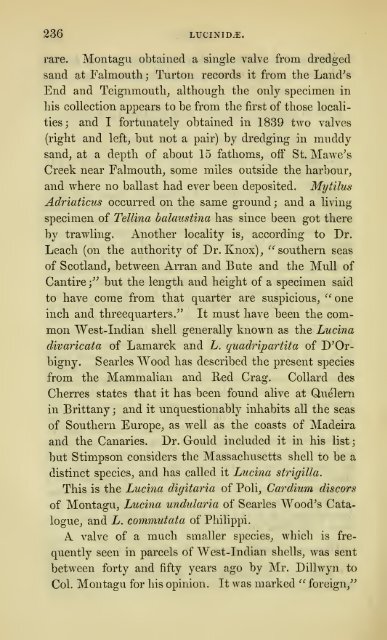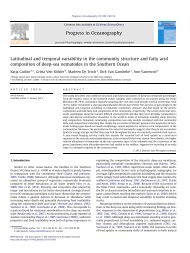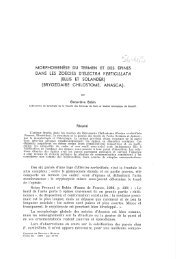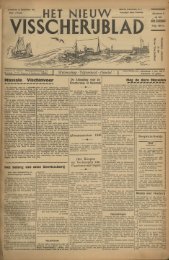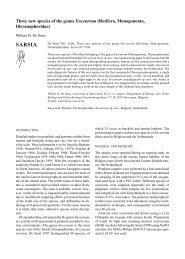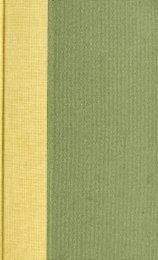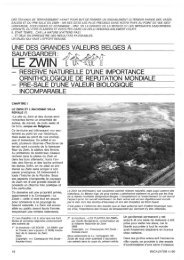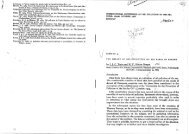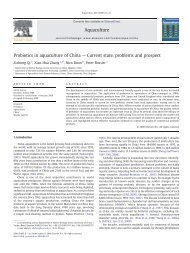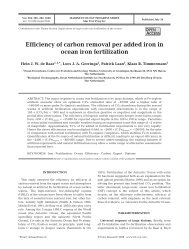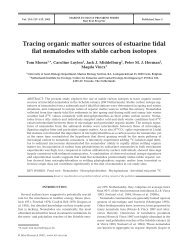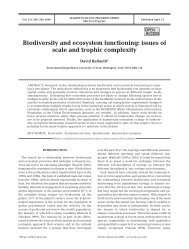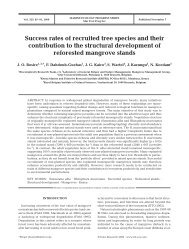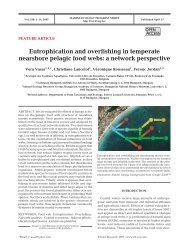- Page 1 and 2:
Pvn H,i I'UitlS ,1 1 Published hy J
- Page 3 and 4:
PRINTED IJY TAYLOR AND FRANCIS, RED
- Page 5 and 6:
IV INTRODUCTION. synonymy and defin
- Page 7 and 8:
VI INTRODUCTION. overlooked, unless
- Page 9 and 10:
Vlll INTRODUCTION. sibility, of man
- Page 11 and 12:
X INTRODUCTION. up only stones and
- Page 13 and 14:
Xll INTRODUCTION. " Emersere fretis
- Page 15 and 16:
XIV INTRODUCTION. Who that breathes
- Page 17 and 18:
2 BRACHIOPODA. * lineage. The Lingu
- Page 19 and 20:
4 BRACHIOPODA. It deservedly gained
- Page 21 and 22:
6 BRACHIOPODA. not been satisfactor
- Page 23 and 24:
8 BRACHIOPODA. * Some Terebralula:
- Page 25 and 26:
10 TEREBRATULIDjE. * Jointed. Famil
- Page 27 and 28:
12 TEREBRATULID.E. complete at the
- Page 29 and 30:
14 TEREBRATULID.E. slight ears, or
- Page 31 and 32:
16 TEREBRATULID.E. hydrographical r
- Page 33 and 34:
18 TEREBRATULID.E. A. Shell ribbed.
- Page 35 and 36:
20 TEREBRATULID.E. mostly blunt and
- Page 37 and 38:
22 TEREBRATULID^. The beak resemble
- Page 39 and 40:
24 CRANIID.E. ** Hingeless. Family
- Page 41 and 42:
26 craniidjE. adapted to the angles
- Page 43 and 44:
28 CONCHIFERA. back, for the admiss
- Page 45 and 46:
30 ANOMIID.E. tioned the modern use
- Page 47 and 48:
32 ANOMIIDvE. similarly sculptured.
- Page 49 and 50:
34 ANOMIID^. ' tally detached from
- Page 51 and 52:
36 AXOMIIDJE. ture, the number and
- Page 53 and 54:
38 ostreid^e. place, and especially
- Page 55 and 56:
40 OSTREID.E. those authorities whi
- Page 57 and 58:
42 ostreidjE. case. In the Report o
- Page 59 and 60:
44 0STREID.E. , separated by a wide
- Page 61 and 62:
46 OSTREID^E. part in the sad trage
- Page 63 and 64:
48 PECTINID^. ants between their te
- Page 65 and 66:
50 PECTINID^E. frame of a fan. Scal
- Page 67 and 68:
52 PECTINID/E. pitted, and sometime
- Page 69 and 70:
51 PECTINID.E. striae : colour red,
- Page 71 and 72:
56 PECTINID^. have the fry attached
- Page 73 and 74:
58 PECTINID.E. P. Islandicus, Miill
- Page 75 and 76:
60 PECTINID.E. hinge and preventing
- Page 77 and 78:
62 pectinid^:. P. opercularis may b
- Page 79 and 80:
64 PECUNIAE. portionate size of the
- Page 81 and 82:
66 PECTINID^. the byssal sinus is f
- Page 83 and 84:
68 PECTINID^. which radiate from th
- Page 85 and 86:
70 pectinidjE. consists of numerous
- Page 87 and 88:
72 PECTINIBvE. prominent : ears lon
- Page 89 and 90:
74 PECTINID.E. rarely, the colour i
- Page 91 and 92:
76 PECTINID.E. whatever they lie up
- Page 93 and 94:
78 PECTINID^E. its own. This remark
- Page 95 and 96:
80 PECTINID^. could scarcely be dis
- Page 97 and 98:
82 PECTIXID.E. Skye ; but although
- Page 99 and 100:
84 PECTINID-E. valve now before me,
- Page 101 and 102:
86 PECTINIDJE. depths. Capt. Beeche
- Page 103 and 104:
88 PECTINID.E. perforated in the ce
- Page 105 and 106:
90 PECTINID^. worms. The fry are of
- Page 107 and 108:
92 PECTINIDJ2. difficulty taken off
- Page 109 and 110:
94 AVICULID.E. Shell shaped like th
- Page 111 and 112:
96 aviculid^:. and the opposite one
- Page 113 and 114:
98 AVICULIDiE. (contained in the '
- Page 115 and 116:
100 AVICULID.E. Shell tapering to a
- Page 117 and 118:
102 MYTILID^E. requires five or six
- Page 119 and 120:
104 MYTILIM. mined the beaks in a c
- Page 121 and 122:
106 MYTILIM. M. hesperianus of Lama
- Page 123 and 124:
108 mytilid^e. the glass. It is als
- Page 125 and 126:
110 MYTILIDjE. being at the time in
- Page 127 and 128:
112 MYTILID.E. curved, placed a lit
- Page 129 and 130:
114 mytilidjE. scription agrees ad
- Page 131 and 132:
116 MYTILID^. black epidermis and q
- Page 133 and 134:
118 MYTILID.E. gas generated in the
- Page 135 and 136:
120 MYTTLID^:. invests itself in a
- Page 137 and 138:
122 MYTILIDiE. and those on each si
- Page 139 and 140:
124 mytilidjE. localities given by
- Page 141 and 142:
126 MYTILIDJE. shaped ; the central
- Page 143 and 144:
128 mytilid^:. Anglesea, in the lin
- Page 145 and 146:
130 MYTILIM. coast, one of them mea
- Page 147 and 148:
132 MYTILID^l. water mark to 20 fat
- Page 149 and 150:
134 mytilidjs. in C. rhombea, owing
- Page 151 and 152:
136 MYTILID^. bivalve. Mr. Bean kin
- Page 153 and 154:
138 ARCID.E. addition to, or subtit
- Page 155 and 156:
140 ARCID.E. Genus I. NU'CULA*, Lam
- Page 157 and 158:
142 ARCID.E. are crossed by finer l
- Page 159 and 160:
144 ARCID^. numerous fine striae wh
- Page 161 and 162:
146 ARCIDM. colouring. The first gr
- Page 163 and 164:
148 ARCID.E. The difficulty arising
- Page 165 and 166:
]50 arcidjE. and at depths ranging
- Page 167 and 168:
152 ARCID^S. mistaken in giving Ten
- Page 169 and 170:
154 ARCID.E. writers to the so-call
- Page 171 and 172:
156 ARCIDiE. filaments : tubes unit
- Page 173 and 174:
158 ARCID.E. Calabrian tertiaries.
- Page 175 and 176:
160 ARCIM. lias a differently const
- Page 177 and 178:
162 ARCID^l. area, or the cavity be
- Page 179 and 180:
164 ARCIDiE. by a Pinna of the comp
- Page 181 and 182:
166 arcidjE. not seem expedient to
- Page 183 and 184:
168 ARCIDiE. fry have a square shap
- Page 185 and 186:
170 arcidjE. as in the last genus ;
- Page 187 and 188:
172 arcid^:. aspect : colour yellow
- Page 189 and 190:
174 ARCID&. he referred to the latt
- Page 191 and 192:
176 ARCID.E. compressed in the midd
- Page 193 and 194:
178 akcidjE. times distinctly visib
- Page 195 and 196:
180 ARCID/E. certainly not that of
- Page 197 and 198:
182 ARCID.E. sen has dredged it on
- Page 199 and 200: 184 GALEOMMIM. A. imbricata, or an
- Page 201 and 202: 186 GALEOMMIDiE. brated voyage in t
- Page 203 and 204: 188 GALEOMMIDJE. are said to be pro
- Page 205 and 206: 190 GALEOMMID.E. in a raised beach,
- Page 207 and 208: 192 kelliid^:. Clark does not menti
- Page 209 and 210: 194 KELLIID.E. that the shell gapes
- Page 211 and 212: 196 KELLIID.E. This curious shell w
- Page 213 and 214: 198 KELLIIDiE. ing another lively s
- Page 215 and 216: 200 KELLIIDiE. occupies the broader
- Page 217 and 218: 202 KELLIID.E. Mr. M 'Andrew's coll
- Page 219 and 220: 204 KELLIID^E. Genus II. MONTACU'TA
- Page 221 and 222: 206 KELLIIDJE. lines of growth : co
- Page 223 and 224: 208 KELLIID.E. astonishing. Many hu
- Page 225 and 226: 210 KELLIID^E. in 8 fathoms, and I
- Page 227 and 228: 212 KELLIID.E. and somewhat thicken
- Page 229 and 230: 214 KELLIIDiE. extremities, not obs
- Page 231 and 232: 216 KELLIID.E. Recluz Erycina Franc
- Page 233 and 234: 218 kelliidjE. leading characterist
- Page 235 and 236: 220 kelliid.i:. middle, produced or
- Page 237 and 238: 222 KELLIID^. diately fixes itself,
- Page 239 and 240: 224 kelliidtE. and the Sphariidce p
- Page 241 and 242: 226 kelliidjE. beak, Tellimya lacte
- Page 243 and 244: 228 KELLIIDiE. who placed it in the
- Page 245 and 246: 230 LUCINIM. According to Valencien
- Page 247 and 248: 232 lucixid^. Genus I. LO'RIPES * P
- Page 249: 234 LUCINIDiE. our southern, south-
- Page 253 and 254: 238 lucinidjE. before I can recogni
- Page 255 and 256: 240 lucinice. and not less to the c
- Page 257 and 258: 242 LUCINID^. orange tint, and thei
- Page 259 and 260: 244 lucinidjE. digged much in nearl
- Page 261 and 262: 246 LUCINID.E. If Lucina has been p
- Page 263 and 264: 248 LUCINID^. gular lines of growth
- Page 265 and 266: 250 LVQimi)m> Molluscorum litora Sc
- Page 267 and 268: 252 LUCINID/E. soalpture, irregular
- Page 269 and 270: 254 LUCINID.E. Diplodonta rotunda't
- Page 271 and 272: 256 CARBIT1D.E. Family X. CARDITDXE
- Page 273 and 274: 258 CARDITIDyE. above-named, I feel
- Page 275 and 276: 260 CARDITID^E. posterior side proj
- Page 277 and 278: 262 CARDITID^. Zostera marina. I ha
- Page 279 and 280: 264 cardiid^:. cardia coralliophaga
- Page 281 and 282: 266 cardiid^:, ments : gills short
- Page 283 and 284: 268 CARDIID^. loped in the tertiari
- Page 285 and 286: 270 cardiidjE. they are sometimes m
- Page 287 and 288: 272 CARDIIDyE. newer pliocene depos
- Page 289 and 290: 274 CARDIID^. the posterior extremi
- Page 291 and 292: ~~6 CARDlIDvE. runs from the beak t
- Page 293 and 294: 278 CARmiDM. 5. C. exi'guum*, Grmel
- Page 295 and 296: 280 CARDIID.E. ling) couldn't get o
- Page 297 and 298: 282 CARDIID.E. Yar. 1. globosa. bei
- Page 299 and 300: 284 cardiidjE. and gradually compre
- Page 301 and 302:
286 CARDIID.E. 8. C. edu'le *, Linn
- Page 303 and 304:
288 CARDIID^. inclined to refer to
- Page 305 and 306:
.290 CARDIIDiE. variableness of the
- Page 307 and 308:
292 CARDIIDiE. ton were a quantity
- Page 309 and 310:
294 CARDIID.E. It is the C. Suedien
- Page 311 and 312:
296 CARDTID^E. what he at Breydon,
- Page 313 and 314:
298 CYPRINID.E. Genus I. ISOCAE/DIA
- Page 315 and 316:
300 CYPRIXID^E. live Crag, and. it
- Page 317 and 318:
302 CYPRINID.E. taken four or more
- Page 319 and 320:
304 CYPRINIDJE. latitude, which wer
- Page 321 and 322:
306 CYPRINID.Ec heaped up in extrao
- Page 323 and 324:
308 CYPRINID.E. Fossil Shells/ from
- Page 325 and 326:
310 CYPRINIDJE. crenulation of the
- Page 327 and 328:
312 CYPRINID.E. cardinals, of which
- Page 329 and 330:
314 CYPRINID^. g-round : doubtful s
- Page 331 and 332:
316 CYPRINIDJE. a bevelled edge : p
- Page 333 and 334:
318 CYPRINID^. B. Smootli or slight
- Page 335 and 336:
320 cyprinidjE. coarsely fibrous. T
- Page 337 and 338:
3.22 CYPRINID.E. and the latter nam
- Page 339 and 340:
324 VENERID.E. has dredged it in Ma
- Page 341 and 342:
326 VENER1DJE. Genus I. VENUS *, Li
- Page 343 and 344:
328 veneridjE. anteriorly, but as t
- Page 345 and 346:
330 VENERIUM. formis of J. Sowerby,
- Page 347 and 348:
332 VEXERID^E. nitidissima. It is n
- Page 349 and 350:
334 VENERIDiE. the Azores (Drouet).
- Page 351 and 352:
336 VENERIDyE. teeth ; margin very
- Page 353 and 354:
338 VENERIDvE. crossed by similar b
- Page 355 and 356:
340 venerid^:. Shell nearly globose
- Page 357 and 358:
342 venerid^:. D. Mantle-tubes disu
- Page 359 and 360:
344 VENERIB.E. gated, as that of so
- Page 361 and 362:
346 veneriDjE. cardinal tooth: insi
- Page 363 and 364:
348 VENERID-S. shorter than they ha
- Page 365 and 366:
350 VENERID^. and the same numerous
- Page 367 and 368:
352 veneridjE. circled with reddish
- Page 369 and 370:
354 VENERID2E. Bushbury Hill near W
- Page 371 and 372:
356 VENERIDiE. brown ; the upper pa
- Page 373 and 374:
358 VENERIUM. ers w or " pullets "
- Page 375 and 376:
360 VENERID.E. are more strongly pe
- Page 377 and 378:
362 VENERID.E. My largest specimen
- Page 379 and 380:
364 VENERID2E. young : beaks small,
- Page 381 and 382:
386 TELLINID.E. This large and well
- Page 383 and 384:
368 TELLINIDiE. worn off and pale y
- Page 385 and 386:
370 TELLINID.E. Genus II. TELLI'NA
- Page 387 and 388:
372 tellinim:. but not extend- gitu
- Page 389 and 390:
374 TELLINID.E. and contiguous umbo
- Page 391 and 392:
376 TELLINID^E. earlier stages of g
- Page 393 and 394:
378 TELLINIDJ5. fold being less dee
- Page 395 and 396:
380 TELLINIDjE. Habitat : All sandy
- Page 397 and 398:
382 TELLINID.E. 5. T. fa'bula*, Gro
- Page 399 and 400:
384 TELLIXIDiE. 6. T. squa'lida*, P
- Page 401 and 402:
.'386 tellinid^e. G. Shell oblong,
- Page 403 and 404:
388 TELLlNIDiE. chi) ; Sicily (Plii
- Page 405 and 406:
390 TELLINID^E. == Macroma tenera,
- Page 407 and 408:
392 TELLINID.E. 1. Psammobia tellin
- Page 409 and 410:
394 TELLINID.E. with rapidity, the
- Page 411 and 412:
396 TELLINID^. 3. P. Ferroensis *j
- Page 413 and 414:
398 TELLIXID.E. P. Ferroensis was p
- Page 415 and 416:
400 TELLINID.E. with the usual shor
- Page 417 and 418:
402 tellinidjE. of Tellina (e. g. T
- Page 419 and 420:
404 TELLINIBvE. dorsal margin on th
- Page 421 and 422:
406 TELLINID.E. to have lost sight
- Page 423 and 424:
408 TELLINID.E. ing small rolls of
- Page 425 and 426:
410 TELLINID^E. present species occ
- Page 427 and 428:
412 MACTRID.E. however, a numerous
- Page 429 and 430:
414 MACTRIDvE. fathoms (Barlee) . I
- Page 431 and 432:
416 MACTRIDJS. below them a bright
- Page 433 and 434:
418 mactrid^:. south of Sweden (Lov
- Page 435 and 436:
420 mactrim. than fringed: tubes cl
- Page 437 and 438:
422 MACTRID^. and more than three q
- Page 439 and 440:
424 MACTRID.E. in all our upper ter
- Page 441 and 442:
426 MACTRID^E. curved on the anteri
- Page 443 and 444:
428 mactridjE. that the laterals in
- Page 445 and 446:
430 MACTRIDiE. coasts of Northumber
- Page 447 and 448:
432 MACTMD.E. they live together an
- Page 449 and 450:
434 mactrid^. and Hanley, and (with
- Page 451 and 452:
436 mactridjE. which are bluntly cr
- Page 453 and 454:
438 MACTRID.E. published at Copenha
- Page 455 and 456:
440 MACTRTD^. Habitat : Estuaries,
- Page 457 and 458:
442 MACTRlDiE. 4. S. te'nuis*, Mont
- Page 459 and 460:
444 MACTRID.E. water. The former oc
- Page 461 and 462:
446 mactrid^:. lini that at Spezzia
- Page 463 and 464:
448 TABLE OF DISTRIBUTION. Table of
- Page 465 and 466:
450 TABLE OF DISTRIBUTION. Species.
- Page 467 and 468:
ERRATA. Page 133, line 12 from top,
- Page 469 and 470:
454 INDEX. Arca {continued). Pennan
- Page 471 and 472:
456 INDEX. Clausina, Jeffr., 247. C
- Page 473 and 474:
458 INDEX. Lima {continued). aperta
- Page 475 and 476:
460 INDEX. Murex (continued). trunc
- Page 477 and 478:
462 INDEX. Peloris, Poli, 38. Perna
- Page 479 and 480:
464 INDEX. Tellina {continued). tru
- Page 481 and 482:
EXPLANATION OF PLATES.
- Page 484:
1. fecten 2. Lund 3. AvLcula,. - -
- Page 488:
a. Nucula,. i \ ctunciohos. Plate I
- Page 492:
Isoeardca / / /'/ w. Plate VI. ' y
- Page 496:
1. AjrvphiaZesma 3. L ///"/'///-///


